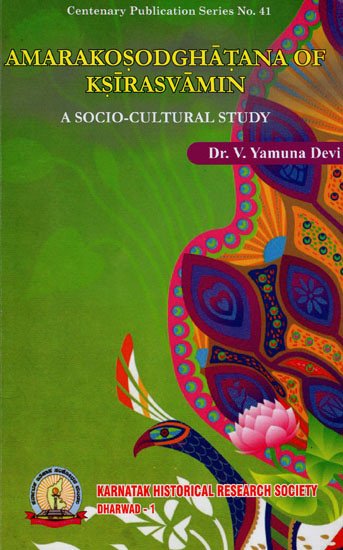Amarakoshodghatana of Kshirasvamin (study)
by A. Yamuna Devi | 2012 | 77,297 words | ISBN-13: 9788193658048
This page relates ‘Buddhism and Buddhist philosophy’ of the study on the Amarakoshodghatana of Kshirasvamin (in English) which represents a commentary on the Amarakosha of Amarasimha. These ancient texts belong the Kosha or “lexicography” category of Sanskrit literature which deals with the analysis and meaning of technical words from a variety of subjects, such as cosmology, anatomy, medicine, hygiene. The Amarakosa itself is one of the earliest of such text, dating from the 6th century A.D., while the Amarakoshodghatana is the earliest known commentary on that work.
Buddhism and Buddhist philosophy
(a) Bhagavān (I. 1. 13; p. 6):
Buddha or Jina was also called bhagavān.
Kṣīrasvāmin explains that one endowed with the bhagas is bhagavān and quotes from Viṣṇupurāṇa the six wealths as–
aiśvaryasya samagrasya dharmasya yaśasaḥ śriyaḥ |
vairāgyasyātha mokṣasya ṣaṇṇāṃ bhaga iti smṛtiḥ | tadvān |
(b) Mārajit (I. 1. 13; p. 6):
Kṣīrasvāmin explains that mārajit was one who has conquered or overcome the obstacles (māra) namely the desire, anger, etc., or according to the Buddhists the one who has won over the four māras namely the skandhamāra, kleśamāra, mṛtyumāra and devaputramāra.
mārān kāmakrodhādīñjayati mārajit |
bauddhāstu skandhamāraḥ kleśamāro mṛtyumāro devaputramāraśceti caturo mārānāhuḥ |
(c) Ṣaḍabhijñaḥ (I. 1. 14; p. 6):
Kṣīrasvāmin mentions the six abhijñas as the divine eye, divine ear, the remembrance of the previous births, the power to know/read others minds, the dimunition of āsravas or karmas and endowed with supernatural powers–
divyaṃ cakṣurdivyaṃ śrotraṃ pūrvanivāsānusmṛtiḥ paracittajñānamāsravakṣaya ṛddhiśceti ṣaḍabhijñā āsya santīti |
(d) Daśabala (I. 1. 14; p. 6):
Kṣīrasvāmin explains that one endowed with the ten powers or strength/potentials was called daśabala and enumerates the ten strengths as follows–benevolence, forbearance, virtue, valour, concentration, peace, power, plan, abstract contemplation and knowledge.
dānakṣāntiśīlavīryadhyānaśāntibalopāyapraṇidhānajñānāni |
